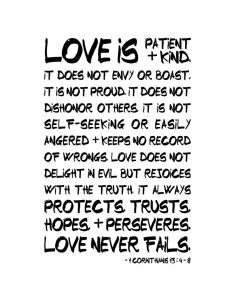A bruised reed he will not break, and a smoldering wick he will not snuff out.
 Those who hold majority world views on same-sex marriage are often carelessly and casually labelled as uncompassionate, backward, bigoted and dogmatic. A good way of examining these charges is to look at the hashtag #LoveWins, which was popularised by the Obama administration.
Those who hold majority world views on same-sex marriage are often carelessly and casually labelled as uncompassionate, backward, bigoted and dogmatic. A good way of examining these charges is to look at the hashtag #LoveWins, which was popularised by the Obama administration.
But first, let us be absolutely clear. The gospel was not given to hand control of society over to a self-selected moral majority; we are not preaching moralism. Nor do we wish to single out any group for condemnation; there are enough planks in our own eyes. We’re answering a popular criticism because it merits an answer; nothing more.
- #LoveWins was a brilliant piece of mass-marketing in service of the controversial political campaign to make same-sex marriage legal[1]. The hashtag brilliantly summarises popular culture’s thinking on this topic. Rather than dwelling on substantial arguments (such as those considered by the Supreme Court) it alludes to ideal like “love is love” or that all “loving relationships are equal.”
- The #LoveWins slogan shifts the focus of the debate; we should be asking if a sexual minority has lost out on deserved rights and economic privileges. Or whether longstanding traditions about the meaning of marriage necessarily prejudice society against same-sex couples. Instead we end up asking, “who are we to say people can’t be married if they love each other?” Now, to be fair, marriage is about love. But all of our relationships should be about love. Jesus even taught us to love our enemies! There’s a bit more to marriage than love 0r even romantic love.
 The slogan is also a little cruel. It suggests that anyone who disagrees with the redefinition of marriage is a loveless, mindless bigot who hates rainbows and public displays of affection. We’ve answered the charge of mindlessness elsewhere on this site. Here we’ll focus on the charge that Christians who dissent from our contemporary political mainstream are prima facie loveless.
The slogan is also a little cruel. It suggests that anyone who disagrees with the redefinition of marriage is a loveless, mindless bigot who hates rainbows and public displays of affection. We’ve answered the charge of mindlessness elsewhere on this site. Here we’ll focus on the charge that Christians who dissent from our contemporary political mainstream are prima facie loveless.- One problem with the argument that marriage is at root about love, and that all loving relationships should be equal in the eyes of the law, is that no-one believes it is true. No-one wants loving polyamorous relationships or incestuous relationships to be recognised. This is not because children born of incestuous relationships tend to have much higher rates of harmful mutations and birth defects. For then we would tolerate the marriage of elderly siblings, or allow two sisters or two brothers to marry. We are not drawing a parallel between same-sex relationships and polyamorous or incestuous relationships. That would be highly offensive; but the fact it is offensive is revealing. Everyone draws a line somewhere; love does not always win.
- There is a good reason for this: while we should love everyone, we have to love them in the appropriate way. Love should change according to its object. We do not love our friends the same way we love our spouses; our children the same way we love our parents.
- What is love, in any case? The slogan does not say. The secular world tends to accept a Romantic myth: that love is an irrational, powerful, healing force which transforms our world and heals our wounds. It is a dangerous myth: in Britain two women die each week as a result of domestic violence. Romantic love does not justify remaining in – or even risking – an abusive relationship
 As parents can testify, love can be a transforming experience. But, while it should never be less than that, it must always be much more. Love is a deep, lasting commitment to serve and sacrifice for another. The experience of love is a powerful motivation; feelings and experiences give our lives colour and wonder. But feelings can come and go. Neglectful- even abusive- parents can have profound feelings for their children. But a parent whose feelings are numbed by stress and overwork, who can no longer feel emotions as she thinks she ought, yet continues to look after her children, still loves them.
As parents can testify, love can be a transforming experience. But, while it should never be less than that, it must always be much more. Love is a deep, lasting commitment to serve and sacrifice for another. The experience of love is a powerful motivation; feelings and experiences give our lives colour and wonder. But feelings can come and go. Neglectful- even abusive- parents can have profound feelings for their children. But a parent whose feelings are numbed by stress and overwork, who can no longer feel emotions as she thinks she ought, yet continues to look after her children, still loves them.- In fact, our feelings are not the best guide to how much we love another. Love should shape our whole character, so that when our feelings fail we continue to serve one other. Love is not measured not by the passions we feel, but by sacrifices we make.
- Love is only love if it is prepared to pay a price. Rainbows and hashtags are prettier than sweat, blood and heartache. Christians believe that #LoveWins is true: but it took a Cross to make it true.
- We cannot earn such love; it can either be accepted or rejected. But, once accepted, the love of Father, Son and Spirit demands we serve others, and that we do so without reward or merit.
Rather than assuming that an individual Christian is unloving or judgmental because he or she will not use a rainbow Facebook cover, it might be better to look at that Christian’s life. Does he or she serve others? We’re talking about more than charitable giving. Does this Christian labour to help those they know and those in need? You will find the measure of a person’s love when you answer those questions.

